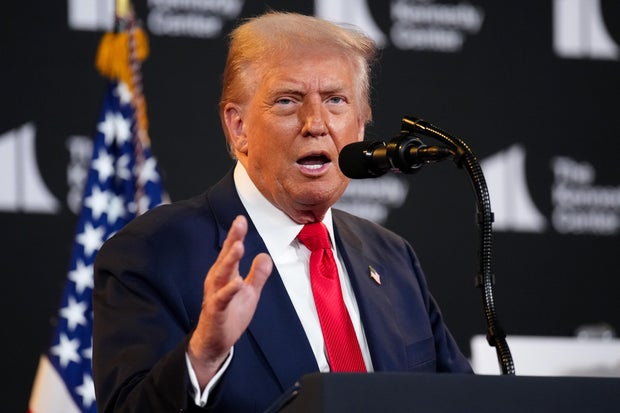Amid ongoing concerns over crime rates in the nation’s capital, President Donald Trump announced on Wednesday a significant policy initiative directly targeting public safety in Washington, D.C. The president stated that his administration would request Congress to approve “long-term extensions” to maintain federal control over the District’s Metropolitan Police Department. These extensions represent a broader strategy by the Trump administration to fortify federal governance on local law enforcement resources in the effort to clamp down on what is perceived as a surging crime wave in Washington, D.C.
Speaking at an event hosted at the Kennedy Center, President Trump expressed optimism regarding legislative support for his plans. “I think the Republicans in Congress will approve this pretty much unanimously,” he confidently remarked to attendees. His administration had already signaled a robust federal intervention earlier in the week by deploying members of the National Guard to the city and announcing an overt takeover of the D.C. police force.
The basis for this direct federal involvement lies in an executive order that President Trump signed on Monday, which commanded the Mayor of D.C. to make the Metropolitan Police Department available for federal use. This directive leverages section 740 of the District of Columbia Home Rule Act—a 1973 law that permits the president to request local police services as deemed necessary. Originally, this law allows such federal command of the local police for a duration of 48 hours, extendable up to 30 days upon notifying Congress. For any time beyond these 30 days, a joint resolution from both the House and Senate becomes necessary.
President Trump, at the Kennedy Center, stressed the need for a lasting legislative solution rather than a series of temporary extensions. “We’re going to need a crime bill that we’re going to be putting in and it’s going to pertain initially to D.C.,” he detailed. “We’re going to be asking for extensions on that, long-term extensions, because you can’t have 30 days.”
Despite his heavy reliance on a Republican-majority Senate to pass the necessary legislation, the arithmetic of the upper chamber means that winning over at least seven Democrats will be crucial for pushing through most bills that abide by the 60-vote threshold for passing legislation. While this adds a layer of uncertainty, the president was clear about his readiness to act unilaterally if he considered it critically necessary. “If I have to, I will declare a national emergency,” President Trump said, though he quickly followed up by noting, “I don’t want to call a national emergency.”
Local police data reported that violent crime within the District has been on a downward trend for 18 months after an alarming spike in 2023. Notable reductions in this period included a 28% decrease in robberies and a 26% overall drop in violent crimes up to August of the current year. Furthermore, the Justice Department highlighted that the previous year saw violent crime in D.C. reaching its lowest level in over three decades.
Amid these complex interplays between federal ambitions and local governance, the debate over the appropriate scale and nature of federal involvement in municipal policing continues to evolve. Critics argue that inflating federal control could undermine local autonomy and disturb established community policing efforts that have contributed to recent decreases in crime rates. Advocates of the president’s approach, however, argue that a firmer hand is essential for creating long-term stability and safety in the nation’s capital, suggesting that a strong federal presence could act as a deterrent against future spikes in criminal activities.
This move by President Trump, thus, is not just about addressing crime but also about setting a precedent regarding federal government’s reach into district-level law enforcement. It rekindles debates on the nature of federalism, state rights, and the liminal status of Washington, D.C., stimulating discussions not only on policy effectiveness but also on constitutional and ethical dimensions concerning governance and civil liberties.
In the ensuing period, as the White House finalizes its proposed crime bill and begins the legislative journey through Congress, all eyes will be on the potentially transformative shifts in law enforcement governance and control in the United States. The outcome will not only impact the immediate security environment of Washington, D.C., but perhaps also influence the broader national landscape of policing policy and civil administration.









